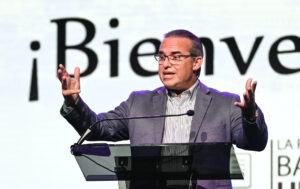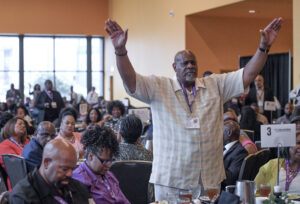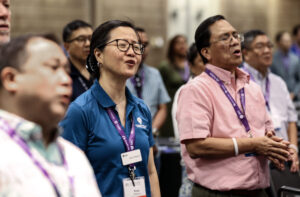
GUINEA, West Africa (BP)–As the truck dipped once more into a muddy crater the size of an elephant, the team realized they were achieving their goal.
They had said they wanted to take the Gospel to remote places where the people had never heard. They realized this Guinea jungle just might be the place Jesus spoke of in Acts 1:8 when He sent His disciples to witness to “the ends of the earth.”
Or at least it felt that way.
“This is exactly what we’re looking for if we want to be the first evangelical presence,” said Bill O’Dell, a Delaware businessman, as his body jostled in the rocking vehicle.
There aren’t enough missionaries to assign full-time personnel to small people groups like those living in this isolated area. That’s why the Maryland/Delaware state convention decided to adopt the Konkabay, an impoverished melting pot of about 7,500 Muslim people who generally farm and live in mud-hut villages in Guinea.
A previous team found that many Konkabay villages have little access to water -– and no access to the Gospel.
“It’s the kind of people group that’s going to fall through the cracks without a chance to hear the Gospel if someone doesn’t take it to them,” said Greg Queen, an International Mission Board missionary who guided the trip.
The last team discovered most Konkabay villages are so deeply Islamic they wouldn’t welcome an overt Christian witness. So the plan is to dig water wells, illustrating the love of Christ before presenting His story.
After months of recruiting, O’Dell enlisted two men from Maryland churches to join him on this second research trip. The goals: scout out possible water well sites and discern which Konkabay villages might be open to hearing the Gospel from future mission teams.
O’Dell and his team members followed local guides to villages most in need of water wells.
Their trucks trekked down ragged roads long ago carved by cattle herds and donkey carts. Numerous times team members lined up behind the truck to heave it through treacherous ruts.
In village after village, elders donning colorful, long robes led the Americans to peer down unusable water wells. Some were dug too shallow. Frogs infested others. One village high in the tropical mountains reported their well dries up during hot season, leaving only mud for drinking and cooking.
The team hopes to bring a simple, portable drilling mechanism along with U.S. teams that can show the villagers how to dig their own wells.
“If they make (the well), it will truly be theirs and they will take responsibility for keeping it up,” O’Dell said. “The relationships built through that can open doors for other things.”
O’Dell and his team are headed back home to find churches to facilitate well-digging. They hope the well digging will evolve into Bible storying, or possibly women and children’s ministry.
“Our end goal is to recruit churches to come out here, adopt a village and (keep coming) until a church is started,” O’Dell said. “There’re people out (here) who have never heard about Jesus and need to hear.”
On the team’s last day visiting in villages, Jorno, a staunchly Muslim town official, invited them to eat at his house. As the team sat on the floor West African-style, eating the rice with their hands, Jorno listed more needs of the village: A school. A hospital. Solar power.
The team felt led to convey they weren’t there just to pour out physical resources.
“We think God can help you more than we can,” Queen told him, explaining the Gospel. “That’s really why we’ve come.”
The town official said he understood their religions are different, but he welcomed them in friendship anyway.
“That’s a good thing,” O’Dell said. “The door has been cracked open. It was locked shut before.”
Paul Willbanks, team member from Greensboro Baptist Church in Greensboro, Md., said he realized through this research trip that the well is a good place to start, just like Jesus with the Samaritan woman.
“To come once and put in a well -– that’s not really going to minister to the people,” he said. “It’s just a beginning. Then we can see how to advance the cause of Christ.”
–30–
The Maryland/Delaware Convention is recruiting churches and individuals to get involved in the Konkabay engagement project. Follow-up trips are planned for February and April/May. For more information, e-mail Dan Sheffield at [email protected].
















